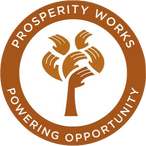Dara Romero, Innovation & Technology ManagerThe best education is lived experience. And honestly, I don’t have a financial background. Instead, I have over 20 years of experience working in corporate human resources, as a small business owner and a non-profit consultant working with marginalized populations. During this time, and across all roles, I helped low- to moderate income employees overcome financial obstacles due to life events while understanding the need for easy to implement and low cost (or no cost) solutions, all while navigating my own financial well-being roller-coaster. My role at Prosperity Works is to support small and mid-sized businesses understand the financial well-being of their employees and provide/promote ways that they can empower their employees to move positively along the spectrum. During Financial Health Week, I’d like to highlight some of the information I’ve shared thus far. While the United States is experiencing record unemployment and a growing Gross Domestic Product, we continue to be inundated with headlines reminding us that Americans are overwhelmed by debt and struggling to save enough cash to cover basic household emergencies. 57% of U.S. consumers, or approximately 138 million adults, are financially unhealthy, according to the 2017 Market Size Study is presented by Center for Financial Services Innovation. Consumer Affairs reports that the latest TD Bank Love and Money Survey found that one-third of consumers admit to living paycheck-to-paycheck. This survey also found that financial stress has major consequences, beyond individual health and emotional well-being. Nearly 20% of all consumers (and 42% of Millennial consumers) have put off buying a home because they can’t make the finances work. The Federal Reserve reported that nearly half of all Americans couldn’t come up with $400 in an emergency. This litany of statistics was recently brought to life as people watched friends and neighbors affected by the five-week Federal Government shutdown struggle to pay bills and buy groceries. Thanks to stagnant wages, increasing costs of living and general workplace instability, we have more and more full-time employed Americans who are falling short of basic middle class milestones. In the 21st Century, workers and employers are renegotiating their obligations to each other. The lack of resilience that results from living paycheck to paycheck has a ripple effect, reducing both workplace productivity and demand, and creating downward pressure on the overall economy. Employers who see the value in providing financial wellness benefits and creating a balanced work environment are the business leaders who will thrive during this transition. We love to sharing tips and content with New Mexico businesses to start the conversation on how businesses of all sizes can help employees build financial well-being. Click on the document below to download some tips on how to maximize personal savings during Tax Time.
0 Comments
Your comment will be posted after it is approved.
Leave a Reply. |
AuthorProsperity Works Staff CategoriesArchives
November 2023
|
Call Us:
(505) 217-2747
Email Us:
[email protected]
|
Prosperity Works is a 501(c)(3) organization dedicated to supporting limited-income New Mexicans build and protect assets they need to be successful. Whether that's investing in education, providing low-interest lending options.
|
© 2024 Prosperity Works. All Rights Reserved.


